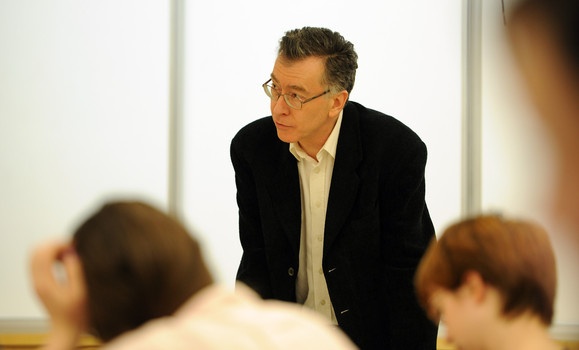Democracy. Freedom of speech. The rule of law.
Ask Canadians and nearly all will agree with these ideas as broad principles. But what happens when the culture surrounding them places them under threat? How can, and should, they be defended?
Those are the sort of questions Dal Philosophy Professor Duncan MacIntosh concerns himself with through his participation in the , a think tank based out of the University of Pennsylvania Law School in Philadelphia. Its focus is on the relationship between ethical issues and the rule of law.
“There is a close connection between what the law requires, what ethics requires and the challenges to those things that are presented to a country in a time of conflict and war,” says Dr. MacIntosh, who is currently chair of Dal’s Department of Philosophy. He explains this idea through the example of the self-radicalization of people within our country’s borders by means of the Internet. Should these individuals have their Internet behaviour limited? Is that true freedom? What seem like simple questions soon become webs of interlacing opinions regarding what is ethical and what is lawful.
“To protect ourselves, we are tempted to do things that limit what other people do and limit what they’re allowed to say,” says Dr. MacIntosh. “Is it okay for a society that values freedom of speech to limit freedom of speech so as to defend freedom of speech?”
Global and local issues
Those are the sort of questions the Center for Ethics and the Rule of Law considers… but what, exactly, is a think tank in the first place?
There are different kinds of think tanks, but Dr. MacIntosh describes the one he is affiliated with as ‚Äúa recurring conference where you could expect to see some of the same people regularly during the year and it‚Äôs usually on the same kinds of themes.‚Äù Unlike some long-established think tanks that have become self-funded institutions with several permanent paid staff members, the Center¬Ý has a higher volume of volunteer participants. It‚Äôs also unusually diverse in its membership: in addition to academics, it includes defense industry executives, military personnel, civil servants, politicians, lawyers, spies, journalists, whistleblowers and many more. It makes for active conversations about issues both national and international in scope.
Three of the topics recently considered by the think tank include sovereignty, strategic rationality and cyber warfare. The latter of these might initially seem like an odd topic, but Dr. MacIntosh explains that the discussion relates to the appropriate retaliation against someone who uses their computers to disrupt another nation’s computers. The think tank has also explored questions about technology in combat. “Should we even build a robot with the capacity to decide who to kill?” asks Dr. MacIntosh.
Connecting to the classroom
Dr. MacIntosh often brings topics from the think tank back to the classroom to discuss with his students. He regularly teaches the department’s Introduction to Philosophy course as well as senior-level courses on specialized topics.
“The bulk of the class is a conversation,” he says of the intro course, where he will introduce the topic for the first half hour, then provide everyone with the chance to contribute their thoughts and ideas. When the think tank’s topics are discussed, he often finds the class gets even more engaging.
“The students know that they are talking to somebody who knows somebody who knows the president (of the United States), and all of a sudden things are a lot more interesting. They become very, very invested because they realize they have access to influence and proximity to power; that there is a stake, and the conversation is not just for class.”

